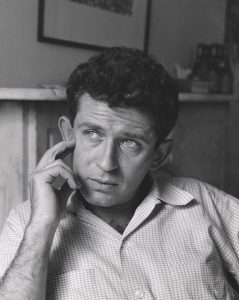Norman Mailer in The Paris Review (1961):
 Sometimes I think my work may be seen eventually as some literary equivalent (obviously much reduced in scale) to Picasso. My vice, my strength, is beginnings. Usually I begin well—it is just that I seem to have little interest in finishing. It seems adequate to start a piece, go far enough to glimpse what the possibilities and limitations might be, and then move on. Which for that matter is close to the discrete temper of our time.
Sometimes I think my work may be seen eventually as some literary equivalent (obviously much reduced in scale) to Picasso. My vice, my strength, is beginnings. Usually I begin well—it is just that I seem to have little interest in finishing. It seems adequate to start a piece, go far enough to glimpse what the possibilities and limitations might be, and then move on. Which for that matter is close to the discrete temper of our time.
This interview was an experiment. Unfinished one obviously. As an attempt to breach an opening into The Psychology of the Orgy, it has a few charms. It may even be possible to write a good book this way; such a book would be a novel. I can think of nothing very much like it, except perhaps for Gide’s Corydon, but the difference is most particular. In Corydon, Gide stepped aside from his Self, and appeared nominally as André Gide-the-Interviewer speaking to some young talented homosexual artist, a man not unlike the hero of The Immoralist. He thus divided his dialogue between two Gides: a young, conventional, severe, most well-mannered and rather agitated young prig, (the ”I” of Corydon) and the subject, a saturnine, scientifically articulated, rather sinister (in the proper tone of the period) man of talent.
In this fragment—The First Day’s Interview—the encounter is less narcissistic. The subject is a Norman Mailer, a weary, cynical, now philosophically turned hipster of middle years; the interviewer is a young man of a sort the author was never very close to. The vector of the dialogue is therefore opposite to Corydon. In that book, Gide appears in a conventional suit and tries to take a trip across the room into himself. He is hoping to seduce his readers. On the contrary, in this piece printed here, the author in full panoply is pretending to travel back to society in order to seduce the brain of the young critic he never was. One might call it a Counter-Diabolism to Gide’s method, and be not at all presumptuous—if one managed, small matter, to finish the book.
More here.
